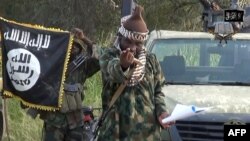Nigeria's military is standing by its assertion that the self-proclaimed leader of militant group Boko Haram is dead.
The military's comments Thursday came after the insurgents released a new video that shows the purported Abubakar Shekau asserting he is alive and that his group is running an "Islamic caliphate" in territory it controls.
In a statement, the Nigerian Defense Headquarters insisted the man in the video, who it says it actually a militant named Mohammed Bashir, was killed last month during a battle in the town of Kondunga.
Last week, the military released photos showing a strong resemblance between the bearded man in the video with a corpse found after the battle.
Thursday's statement said the new video, released by French news agency AFP, had no indication of when it was recorded and did not make any reference to events that have happened since the death of what the military called "the impostor."
The military says the real Shekau has been dead for some time.
The man in the new video says Boko Haram has implemented strict Islamic law in the areas it has captured in northwestern Nigeria, mainly in Borno state.
According to AFP, the 36-minute video shows footage a man being stoned to death for adultery, another having his hand cut off for theft, and a man and a woman receiving 100 lashes for having sex out of wedlock. The agency says crowds are seen watching the punishments.
The video also purports to show the wreckage of a Nigerian Air Force jet that went down in the northeast on September 11. Boko Haram said its fighters shot it down but the military denied the claim.
Much about Boko Haram has remained unclear, even mysterious, since the radical group launched its uprising against the Nigerian government in 2009.
The group is blamed for for thousands of deaths across northern Nigeria and claimed responsibility for the kidnapping of more than 200 girls from the town of Chibok in April. More than five months later, none of the girls have been rescued.
The government has struggled to stop the attacks, despite deploying thousands of troops to the northeast and imposing emergency rule in three states.





